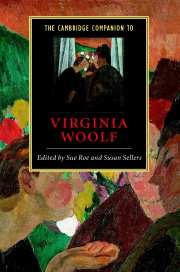Book contents
- Frontmatter
- 1 Bloomsbury
- 2 Finding a voice
- 3 Literary realism in Mrs Dalloway, To the Lighthouse, Orlando and The Waves
- 4 The novels of the 1930s and the impact of history
- 5 Virginia Woolf's essays
- 6 Virginia Woolf's diaries and letters
- 7 Virginia Woolf and the language of authorship
- 8 Virginia Woolf and modernism
- 9 The impact of post-impressionism
- 10 The socio-political vision of the novels
- 11 Woolf's feminism and feminism's Woolf
- 12 Virginia Woolf and psychoanalysis
- Guide to further reading
- Index
10 - The socio-political vision of the novels
Published online by Cambridge University Press: 28 May 2006
- Frontmatter
- 1 Bloomsbury
- 2 Finding a voice
- 3 Literary realism in Mrs Dalloway, To the Lighthouse, Orlando and The Waves
- 4 The novels of the 1930s and the impact of history
- 5 Virginia Woolf's essays
- 6 Virginia Woolf's diaries and letters
- 7 Virginia Woolf and the language of authorship
- 8 Virginia Woolf and modernism
- 9 The impact of post-impressionism
- 10 The socio-political vision of the novels
- 11 Woolf's feminism and feminism's Woolf
- 12 Virginia Woolf and psychoanalysis
- Guide to further reading
- Index
Summary
'The greatest benefit we owe to the artist,' George Eliot once claimed, 'whether painter, poet, or novelist, is the extension of our sympathies.' As richly enlarging as they are tightly controlled, Woolf's novels 'benefit' the reader in just this fashion. But while it has long been agreed that they are geared towards broadening our aesthetic responsiveness - as we read Woolf's novels, we are prompted to question how and why we read fiction and to acknowledge the limitations of our answers - it is only relatively recently that the degree to which her novels seem conceived to extend our ethical and political 'sympathies' has begun to be recognised. An ideological bias, unobtrusive but palpable, is at work, for instance, in The Voyage Out, Jacob's Room, To the Lighthouse and The Years, and readers of these novels are challenged to think just as hard about the wider moral, social and political issues which the novels encompass as they are required to come to terms with the writerly goad of the texts. As early as 1908, Woolf noted in her journal that she had grown to 'distrust description' and that she wished to 'write not only with the eye, but with the mind; & discover real things beneath the show', and this was to become her principal aspiration as a novelist. In the same year, Woolf congratulated E. M. Forster for having won her over to what she presumed to be his own position in A Room With a View.
- Type
- Chapter
- Information
- The Cambridge Companion to Virginia Woolf , pp. 191 - 208Publisher: Cambridge University PressPrint publication year: 2000
- 1
- Cited by

